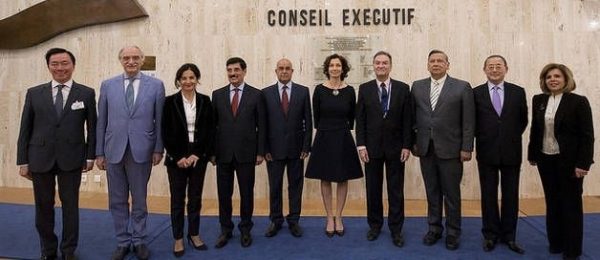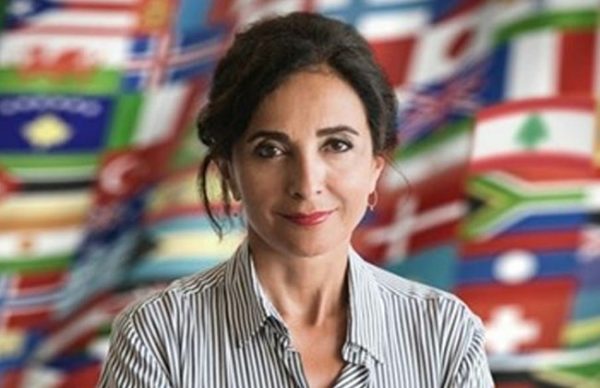 The UNESCO headquarters in Paris on October 9 will see elections for the organization’s top post of director-general, with eight candidates competing to succeed the Bulgarian Irina Bokova after the withdrawal of the Guatemalan candidate.
The UNESCO headquarters in Paris on October 9 will see elections for the organization’s top post of director-general, with eight candidates competing to succeed the Bulgarian Irina Bokova after the withdrawal of the Guatemalan candidate.
The eight candidates are: Moushira Khattab from Egypt, Vera El Khoury from Lebanon, Hamad Bin Abdulaziz Al-Kawari from Qatar, the French Audrey Azoulay, Chinese Qian Tang, Polad Bülbüloğlu of Azerbaijan, Pham Sanh Chau of Vietnam, and Saleh Mahdi Al-Hasnawi of Iraq.
UNESCO is a specialized agency of the United Nations established in 1945 and is currently headed by Bokova who won the elections of 2009 with 31 votes ahead of the runner-up, Egypt’s former Culture Minister Farouk Hosni, by three votes.
The main objective of the organization is to contribute to peace and security by raising the level of cooperation between the countries of the world in the fields of education and culture to bring about universal respect for justice, the rule of law, human rights and fundamental principles of freedom.
UNESCO has 195 member countries and is headquartered in Paris. The organization has more than 50 offices and several teaching institutes around the world. It has five core programs: education, natural sciences, humanities and social sciences, culture, and communications and information. It also supports many projects such as literacy, technical training, teacher training and training programs and global science programs.
Moushira Khattab headed to Paris last week to participate in her electoral campaign in the media with the member states. Ambassador Mohamed Orabi, the head of the campaign, also visited Nigeria in order to obtain African support for the Egyptian candidate.
Fifty-eight members of the UNESCO Executive Council will hold meetings from October 4 to 18 at the UNESCO headquarters under the chairmanship of Michael Worbs, Germany’s ambassador to UNESCO, to choose the candidate.
The person to be nominated by the Executive Board will be chosen by secret ballot, during a vote that will take place during the board’s 202nd session in October 2017.
Subsequently, the Chairperson of the Board shall inform the General Conference, during its 39th session in November 2017, of the candidate nominated by the Board. The General Conference shall consider this nomination and then elect, by secret ballot, the person proposed by the Executive Board.
The new Director-General of UNESCO would take office on November 15 for four years as Director-General of the Organization, while the Executive Board, which meets twice a year, will finalize the draft Program and Budget of the Organization for the period 2018-2021, to be submitted to the General Conference for approval.
The French candidate Audrey Azoulay is the most prominent competitor to the Egyptian candidate, and her candidacy came as a surprise to all, especially that France had announced its support for the Egyptian candidate Moushira Khattab.
The French candidate clashed with the Arabs in France who accused her of running the elections out of her racist anti-Arab positions, which prompted her to respond in remarks published in the French newspaper Le Soir in March saying that she had been nominated at France’s request and not at her own will, adding that former French Foreign Minister Jean-Marc Ayrault has signed her nomination papers.
The new French ambassador in Cairo Stephane Roumtier said that Khattab is as the strongest competitor to the French candidate, saying that the “elections will not be a conflict between Egypt and France, but will be fair elections.”
He added that Khattab has great advantages that qualify her for the post, as well as the French candidate, Audrey Azoulay, who has the same advantages.
Egypt has the support of dozens of member states of UNESCO, including India and all African countries, and has received the support of Saudi Arabia, the UAE and Algeria.

About the Lebanese candidate Vera El Khoury
Vera El Khoury Lacoeuilhe is born in Beirut in 1959. She is a diplomat with over two decades of in-depth experience in multilateral diplomacy and international relations, according to her website veraforunesco.com
Her broad knowledge of the design and structure of international organizations gives Vera El Khoury Lacoeuilhe international-level recognition as an authority on the UN system. In January 2016, she became a member of the “Independent Team of Advisors” established by the Economic Social and Council of the United Nations (ECOSOC), to formulate recommendations on the long term positioning of the United Nations Development System. She also teaches at the Paris I Pantheon-Sorbonne University a Master 2 level seminar entitled “International Institutions and Organizations”.
Since 1996 she has driven in UNESCO a tireless agenda for focus and the strengthening of governance and effectiveness, which contributed to the Organization’s ambition to remain relevant in a changing world. Today she is regarded as a leading authority on UNESCO.
Vera El Khoury Lacoeuilhe, who embodies the highest ethical standards, will vigorously pursue UNESCO’s value adding activities with a real impact. She believes in UNESCO’s fundamental contribution and relevance to building a global mind-set for peace and progress.
Vera El Khoury Lacoeuilhe is a politically astute negotiator and effective consensus builder. She has a track record of imparting gravitas to political roles and has headed multiple delegations to ministerial meetings and chaired numerous intergovernmental committees.
Her reputation for leadership has merited the respect of her peers. Consistently, she has been chosen to lead teams on reform of the Organization and other politically sensitive issues. She leads through engagement, persuasion and diplomacy. Her results indicate the strength of her inspiring leadership as well as her political judiciousness.
Egyptindependent.com /veraforunesco.com

Leave a Reply
You must be logged in to post a comment.